Feeding little kids is a challenge, but it’s quite possible their eating habits and behavior are totally normal. Picky eating is actually a very typical developmental phase, so if you know what to expect, you can handle the ups and downs with grace and patience as you remember learning to eat is a very long process!
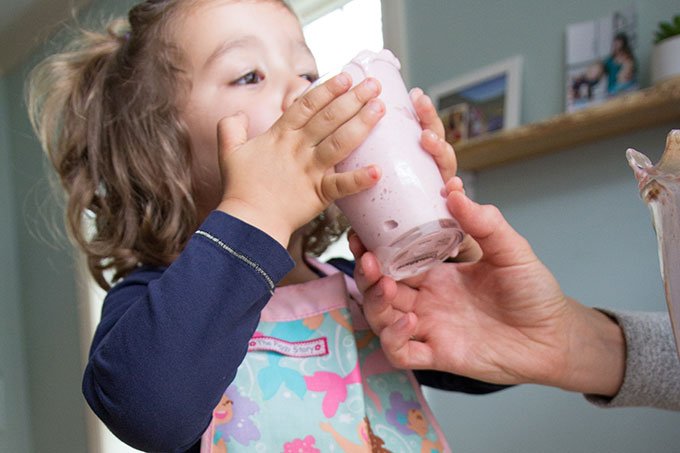
Picky Eating
Trust me, I’ve been there. There’s the refusal to eat a meal you’ve made. Not wanting to eat foods they loved yesterday. Changing their minds about the foods they want in the middle of a meal. Having no appetite one day, then eating everything in sight the next day.
It can make our heads spin. By nature, toddlers are very (very) fickle eaters. This normal nature of variable toddler appetites can be intensely frustrating and unpredictable, and it can make us feel like a moving target at the table. Plus, when you combine it with the love that our toddlers have for routine, the expected, and the known, it’s easy to find yourself in a situation where your 16-month-old only eats one very particular type of bread. Or your 3-year-old refuses everything except crackers and cheese for lunch.
Every single day.
Table of Contents
- Picky Eating
- The Importance of Exposure
- The Five Internal Drives to Eat
- When Picky Eating Isn't a Problem
- A Toddler Isn't Hungry for Breakfast
- A Toddler Doesn't Eat Much of a Food They Usually Like
- Your Toddler Wants ONLY Blueberries
- A Toddler Eats Only Three Foods
- Toddler Refuses Dinner ... But Wants All the Snacks
- Toddlers Don't Eat the Range of Foods They Did as Babies ... Why?
- Serve Foods You Want Your Kids to Eat
- Remember Kids Are Still Learning
- When to Seek Medical Help
Your toddler won’t eat? Help is here!
Sign up for our email updates to get tips and ideas sent to your inbox.
The Importance of Exposure
For kids to feel comfortable enough to try a food, the newness has to go away. “It doesn’t go away in 2 offerings or 5 offerings, and often not in 10. Kids need to see things consistently in different settings by different people. It’s normal that your child doesn’t try things in the beginning and that they reject them in the beginning. It’s a normal phase of development,” says feeding therapist Jenny Berry.
“We can expose kids to a wide variety of foods by eating it ourselves, by having them be involved in the preparation of it, by taking them to the grocery store. We can expose them to a lot of foods without putting that insane pressure on ourselves,” she says. Our job isn’t to dictate what goes into their mouths, even though most of us assume we need to do that.
The Five Internal Drives to Eat
When assessing how things are going with food and your child, Jenny recommends looking at all of the internal drives to eat—which includes more than just hunger. These five drives are the natural reasons to eat, and we need to learn all of them in childhood to be well-rounded, healthy eaters. They include:
- Hunger
- Togetherness
- Curiosity
- Novelty
- Comfort
If you can step back and keep those at the forefront of your mind, especially when you’re feeling conflicted about what to feed your family or yourself, it can help. If you’ve got one of those 5—like if your child is enjoying time with a sibling and food is involved—then one of the internal drives to eat is being met and you’re good.
“Health is about more than food. It’s about the whole child. Are they happy and participating in school? Are they affectionate and emotionally doing OK? Are they meeting milestones and progressing? Then we’re in a good spot and we don’t have to make it about the food all the time,” Jenny wisely explains.
TIP: Remember you want the kids to feel safe and comfortable around food for years to come, not just to eat a bite of broccoli today.
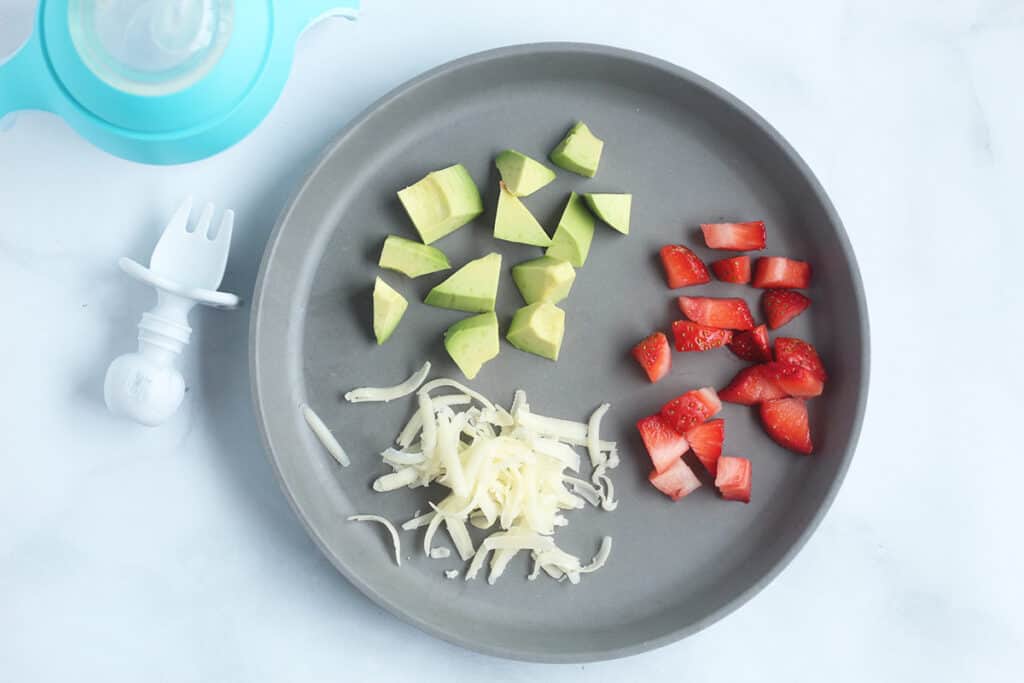
When Picky Eating Isn’t a Problem
Most kids go through a stage called neophobia between ages 2 and 6 where they are naturally more skeptical of new foods. (And “new foods” can mean foods they haven’t seen in a while and don’t remember.) If you can realize that a toddler not eating this is normal, expect them to bring this outlook to the table, and know this way of eating isn’t necessarily a problem in the long run, you’ll be much better equipped to handle your own feelings about what they may or may not be eating.
Here are a few examples of how this could play out and how you might want to handle them.
A Toddler Isn’t Hungry for Breakfast
At breakfast, you offer cut-up peaches, plain yogurt, and a little toast. Your toddler eats only the peaches and throws the rest onto the floor and smears the yogurt all over. You get frustrated because, well, such a mess! So disrespectful of your efforts!
Reality Check: It’s entirely possible your toddler isn’t a big breakfast person and simply wasn’t hungry for much more than fruit. You could try pushing breakfast back 20-30 minutes (if you have the time), drastically cutting back the amount of food you serve so your expectations for the amount they will actually eat are naturally lower, or even thinking of breakfast as a “snack” and the midmorning snack as “breakfast”. They may surprise you and eat a ton at 9 a.m. versus 7!
A Toddler Doesn’t Eat Much of a Food They Usually Like
One night at dinner, you serve up a big bowl of the pasta your toddler typically inhales. He eats some, but not as much as you expect, and skips the broccoli that’s on the side. Argh! Why isn’t he eating as much as he normally does? He loves this meal!
Reality Check: Maybe he’s tired or teething or he simply had a bigger or later afternoon snack than the last time you made this meal. Maybe the texture of the broccoli just wasn’t doing it for him today. Who knows!
If we try not to compare our toddler’s intake with previous meals and simply let it be what it is, we’ll be able to accept that they’re simply trusting their own hunger cues. Try not to push and don’t coerce bites—which often turns into a power struggle at that meal and meals going forward, and is no fun for anyone—because it’s really up to them to decide how hungry they are.
It’s VERY normal for hunger to fluctuate. And it’s very hard to accurately predict how hungry someone else might be at any given meal.
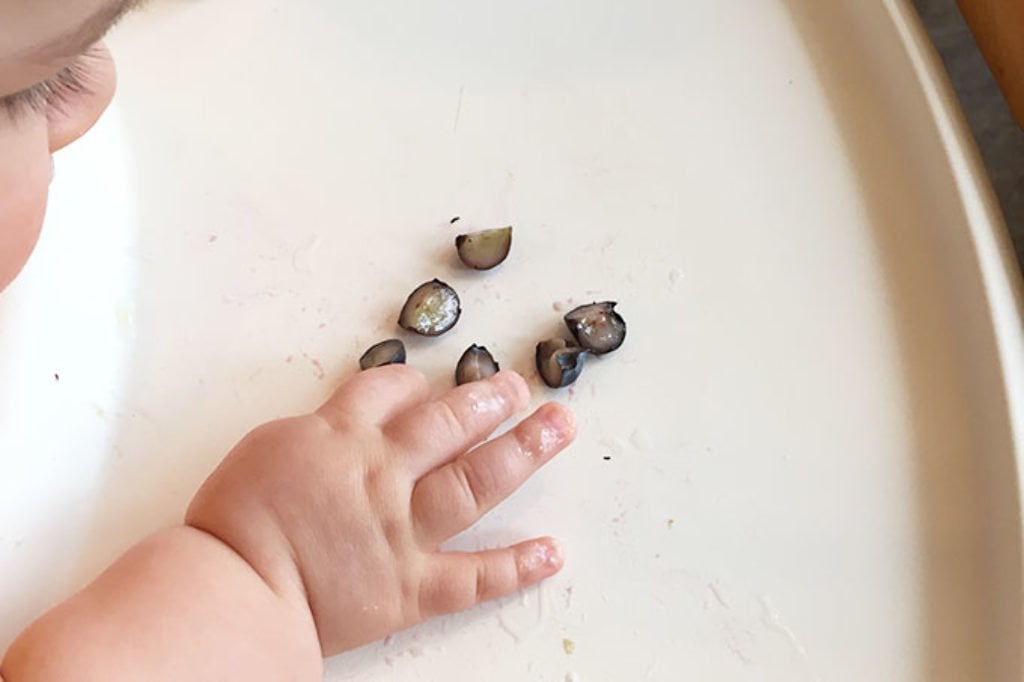
Your Toddler Wants ONLY Blueberries
You put out a bowl of blueberries (or another favorite food of the moment!) as a pre-dinner snack and your toddler eats them all and wants more. She wants more so badly that she turns into a sobbing mess. There literally aren’t any more blueberries in the house and you try your hardest to get her to understand you. She doesn’t and refuses to eat dinner.
Reality Check: Toddlers feel many things very intensely and this goes for their food preferences, too. And the concept of running out of foods is still a little fuzzy to them, so in their mind, they simply want more and you aren’t giving it to them. It’s upsetting!
Your toddler is not crazy for losing her mind. She is tired at the end of the day and is disappointed. She will not waste away if she skips dinner. She won’t grow up to be unable to control her emotions as an adult. She’ll go to bed, sleep well, and likely be super hungry for breakfast the next day. And she might even consent to eat something other than blueberries! (This should improve as they get older.)
Even though this can seem crazy to us, this reaction is actually very developmentally normal for little kids.
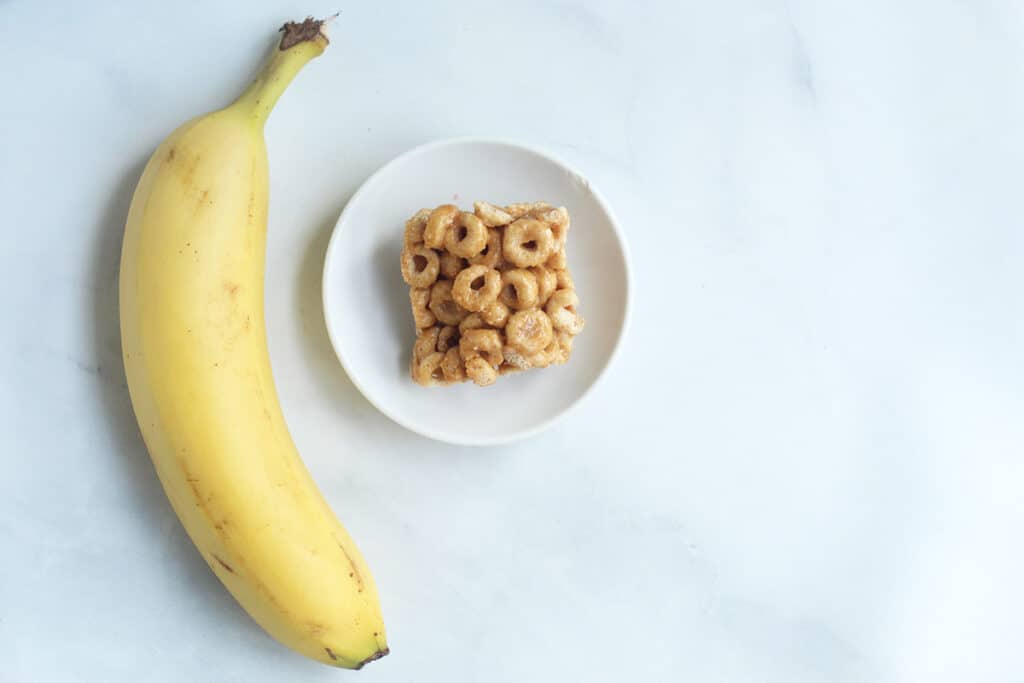
A Toddler Eats Only Three Foods
Your toddler eats only mac and cheese, yellow cheese, Cheerios, and bananas, and you’re losing your mind because you can’t get her to eat anything else. Won’t she be malnourished without eating a wider range of foods!?!?
Reality Check: It can often feel like our kids don’t eat anything other than a few things. I challenge you to keep a running list of everything they eat over the course of a week, not simply a day. You might be surprised to see the list get longer than you expect. (And, hey, your toddler does eat mac and cheese, yellow cheese, Cheerios, and bananas, which is something!) But if you do find your toddler is relying on favorite foods at most meals, try these simple tips to encourage trying new foods.
And always continue to offer a range of food in addition to these favorite foods to make sure you’re exposing the child to other foods. Serve them in small portions and make sure they taste good to you. Hopefully your child will eventually become less fearful of these other foods and will taste them—as long as dinner doesn’t turn into too big of a power struggle—so do your best to stay neutral about what they eat and not push too hard.
TIP: Read more about the Division of Responsibility in Feeding, which will give you a helpful framework for serving kids food.
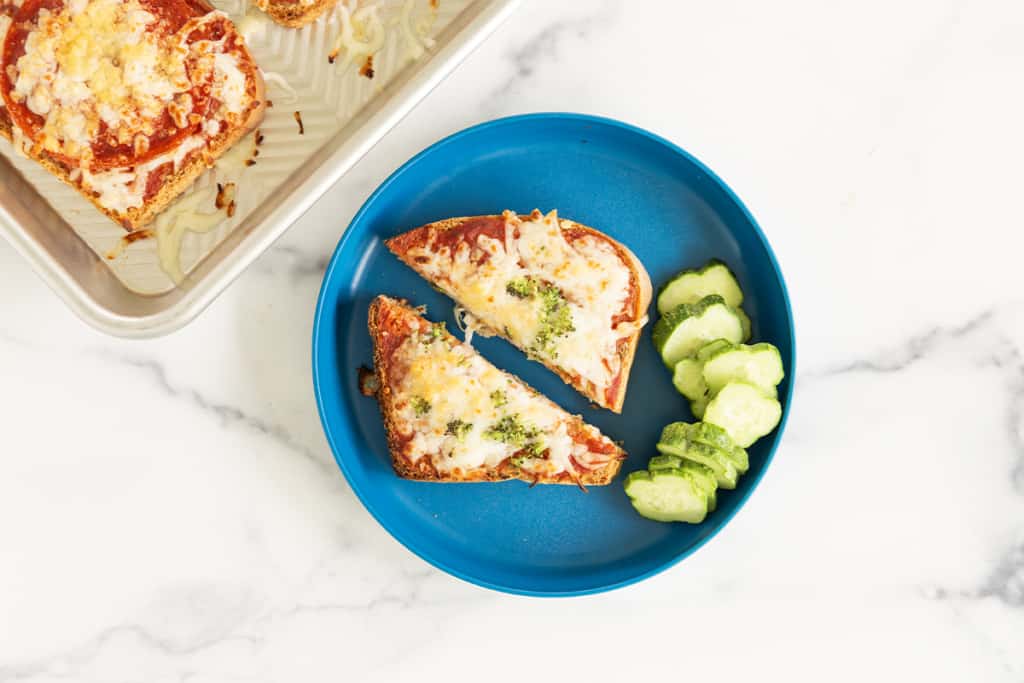
Toddler Refuses Dinner … But Wants All the Snacks
Dinner is often refused, but your toddler routinely asks for a snack when it’s time for bed. You usually give it to him because you don’t want him to go to bed hungry, yet you hate that he’s turned into such a picky eater!
Reality Check: Kids are smart and if they know they can hold out for preferred snack foods instead of eating dinner, and buy themselves a bit longer before bedtime, they will do it! So you need to decide on a plan.
Here are some options: Make a bedtime snack a regular thing and choose foods that aren’t too exciting (fruit, cheese, plain cereal). Or, take food after dinner off the table as an option by explaining that the kitchen is closed after dinner, there will be no snack, and if you don’t eat your dinner, you can be hungry for breakfast. Or, incorporate more “snack” foods into meals and more “meal” foods into snacks. This can help take those snack-type foods off of a pedestal and normalize them a little more.
TIP: If your toddler isn’t eating, learn about normal toddler eating.
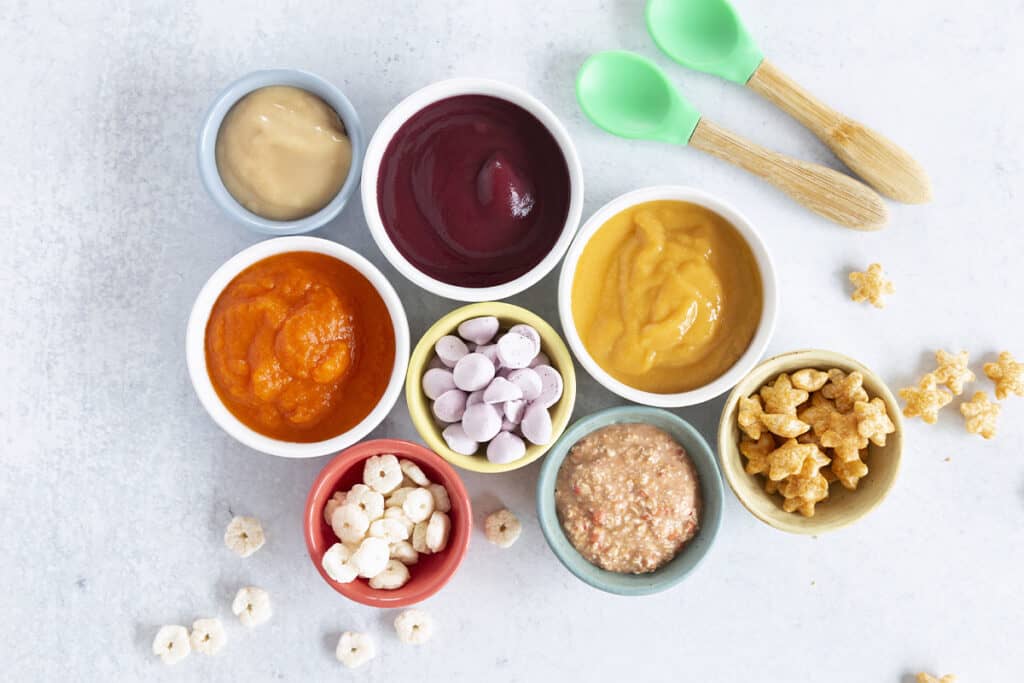
Toddlers Don’t Eat the Range of Foods They Did as Babies … Why?
As toddlers grow out of babyhood, they become more aware of the world around them—and their power in it. Combined with that, they are usually growing less than they did as babies, so their hunger may simply be less than it was.
Reality Check: Toddlers love routine and in many circumstances, this is a great quality because it helps them to make sense of the world as they move throughout their day. But when it comes to food, routines can quickly turn into set-in-stone habits that are crazy hard to break. I always joke that if I do something twice with my oldest, I’ll have to do it every day for the rest of my life so keep that in mind with snacks and favorite foods.
Here are some tips to keep in mind for feeding kids:
- If a child doesn’t want to eat a food they used to like, it’s possible they just aren’t as hungry as you expect.
- Serve a smaller portion.
- Offer a funny utensil like a big fork, spoon, or mini tongs.
- Offer a dip or ask “how can I make this yummier?”
- Eat a range of foods in front of the kids.
- Offer to let them help you with some food prep so they are exposed to foods without the pressure to eat them.
TIP: One-year-olds grow less quickly than they did as babies, so your kiddo may hit 17 months and simply be less hungry than you expect. That is very, very normal.
Serve Foods You Want Your Kids to Eat
As much as possible, serve the foods you want your kids to eat and let them decide what of it to put into their mouths. They will not waste away if they don’t eat a good dinner every night. They will not have stunted growth if they never touch kale until after college. You are not a bad parent if you can’t get them to eat their broccoli!
And as with all things kid-related, remember this particular phase you’re in with feeding your little ones will soon pass (and if it doesn’t, the Division of Responsibility is still a great way to handle it) and they’ll be on to challenging you with the next thing. They will not live on cheese and crackers forever, I pinky swear. Stay calm, try not to take it personally, and remember: They’re just being toddlers!!
Remember Kids Are Still Learning
We continue to learn to eat as we grow over a long period of time, so it can help a lot to take some of the pressure off yourself that everyone needs to like every food right now.
The truth is we adults don’t like every food. And it’s OK if we all enjoy different things. Yes, we need to be able to feed our families without going crazy with effort, but a lot can change with the simple perspective shift.
When to Seek Medical Help
If you’re ever very stressed or worried, if your child is not gaining weight, growing, and meeting their milestones, if something about their overall health or demeanor seems off, or they are having serious texture aversions, please check in with your pediatrician. This post is not meant to be a substitute for medical advice.
Related Posts
This post was first published December 2018.
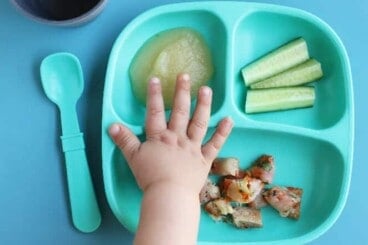
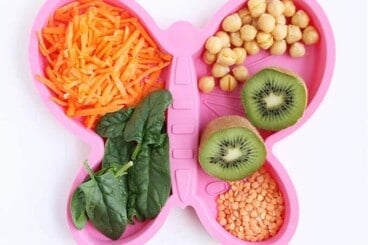
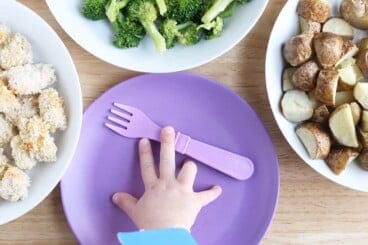


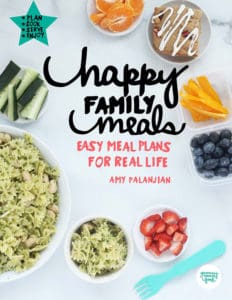

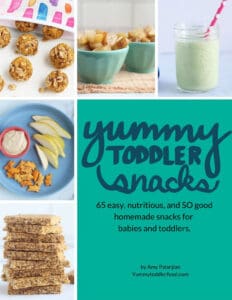















Just wanted to say thank you for this article- I wish you had been around when my oldest was little – this has made me feel so much better! Sometimes all you see is children eating up all their food and I often wonder what I am doing wrong (all 3 have been fairly picky eaters) but this has encouraged me to keep going just still offering new things and getting the exposure (with my first I just gave in and fed him things I knew he liked and would eat)
You’re welcome!
What if your child just takes everything they don’t like off their plate? My son is 3.5 and literally will pick everything he doesn’t like off his plate and put it on mine or his dad’s. If I put it back, it basically turns into a food fight. I’ve tried putting veggies and things in a small bowl to the side, he just shoves it across the table as far away as possible. He eats a wide enough range that I’m not worried about his health but it’s impossible to expose him to new things in the way most articles suggest. He does help me cook, but he absolutely will not try anything with too many mixed-in ingredients so I end up separating out each component on his plate. I’m not so much thinking about veggies, I didn’t eat many until I was an adult and will now eat anything so I’m not concerned there, but I’d like it if he’d even consider something like lasagne, even minus the veg and I have tried cooking him a mini one without veg and then deconstructing it on his plate but it’s still a no.
First, him seeing the foods on the table IS exposure. It doesn’t have to be on his plate or something he tries to count. And second, the mixed in foods thing is really challenging and can feel so limiting when we’re deciding what to cook, but it is fairly common for this age. I would try to think how you can shift that power balance more in his direction at the table. Let him put the food onto his plate (with help) as needed. When you serve lasagna, let him see what goes into it and show him how to eat just the noodles if he prefers. Give him a little knife so he can start to cut his food himself. Let him choose between two foods to have on the side with that meal. Some of this simply takes some time because mixed textures are often a challenge for kids to eat, and also some kids need time to build up more comfort with a broader range of foods. The fact that he’s around a lot of different foods is AWESOME and is certainly not nothing. This learning to eat phase can take a lot of time and it may help to remember that when you’re in the thick of a meal that isn’t his favorite. I know that’s not a perfect answer, but I hope a little more context can help you see that there are ways through this that don’t require food fights (hopefully!)
My almost 14 month old is a stubborn little thing. She’s been in a throwing phase since about 8 months and as we transitioned to meals and decreased the milk intake when she turned one, the throwing and refusal for food just keeps growing. She eats a fair number of different things–carrots, cheese quesadillas, manderins, peaches, eggo cinnamon toast, nut butter pouches, cheerios, graham crackers, hummus, sweet potato, apple sauce–but when introducing new things she sometimes doesn’t even taste it, she just throws it all. She won’t eat any meats/chicken; when she does put pasta in her mouth, she takes it out and throws is. So she’s a typical picky eater but it’s compounded by the throwing that we absolutely cannot get her over. We try offering things she likes along with new things and she ends up throwing everything and crying. I’m not sure what else to try to get her to eat other things. Any thoughts?
At this age, kids are still learning to eat, so it may help your perspective to swap out “picky” with “learning” and know that not all kids like all foods right away. This age also often seems a dip in appetite since growth slows in one year olds as compared to when they were babies, so she simply may not be as hungry as you’re expecting. With the throwing, keep portions small and consider giving her a specific place to put the food she doesn’t want–on her highchair tray or in a little bowl. It’s normal for kids to refuse food, so do your best to continue to expose her to new foods (and sit with her during meals as you can so she sees you eating them) and remember that it’s okay if she doesn’t eat all of them right away. I know this is frustrating!
Hi, my son is 3 years old and he only eats oatmeal and pasta for dinner not all pasta has to be Alfredo with out the chicken. I’ve tried all food ms you can think of and he still wants oatmeal and pasta for dinner. My son doesn’t eat the food at daycare they prepare. I have to pack his snacks which is yogurt , chips and Oreo cookies and he will eat that. By the time my son gets home from daycare he’s starving. Any suggestions.
Hi- It’s really up to you on how to handle it. You can continue offering the foods you know he will eat with small portions of other foods without pressure to regularly expose him to other foods and have patience if it takes a long time for him to expand his intake. You can involve him in cooking to see if he might be open to more foods if he feels more in control of them. You could try to talk to him about why the foods at daycare aren’t working and what everyone might be able to do to help him eat more foods. (He is young, but he may be able to verbally give you ideas about why the daycare food is off putting.) You could work with a responsive feeding therapist for one on on help, which would be able to consider more of the feeding history and context of your life in recommendations and practices. If a child is down to the 5 foods you mention and is that specific about type of each one, that is usually a time to consider a feeding therapist since that is considered outside the “normal”. Checking in with your pediatrician is always a good idea too to make sure there aren’t concerns about growth or development. I know this is hard!
Just wanted to say thank you so much for this article! I was starting to get frustrated with my newly picky 2.5 Yr old but this has really helped me to feel more relaxed again. I have never forced her to eat something as I know that would not help matters and all this info has cemented that I’m following the right approach. Thank you so much!
Thanks for the reminder! My 13month old is a tough nut to crack. Her favourite is mini king oyster mushroom and it cannot be other types of mushroom. She eats a particular type of vegetable on a day and the next? Off the plate it goes. Green leafy veg are tough for me to serve to her. She enjoys chicken airfried then peeled (on some days); not minced nor cut up. She takes noodles (soba, udon & pasta) mostly but just on some weird days, none of them gets into her tummy. She does not like porridge (overexposed as have been eating since she started solids. Asian family with old folk insisting feeding porridge and rice (since turned 1 year old)). She does not like oats or bread and most fruits too. She takes breastmilk anytime but food is important too!
Help! I can’t be feeding her only noodles with chicken and borderline no vegetables!
What if you reminded yourself that everything you say here is 100% normal for her age? Would that ease your worry? (There’s nothing wrong with noodles.) I recommend that you zoom way out with her intake and instead of focusing so closely on each meal, think of what she’s eating over the course of the week. You list a lot of foods here so I bet she’s actually eating a wide range over a broader span of time. There’s more info here: https://www.yummytoddlerfood.com/when-picky-eating-isnt-a-problem/
I hope that helps!
we Have a year in half month old and he only likes certain things to. He likes pears, oranges that are in a can or fresh just like he likes bananas, and apple. If we do go out he likes apple sauce and French fries and that is all he will eat for us. But he also will try different types of gram crackers and he loves his milk and cheerios. Put I don’t know how to get him to eat fish, and pasta because I try them with out sauce and them I try him with sauce and it is flavorful and it tastes good but he won’t try them is any other way that I can get him to try different foods with out being to pushy. Because he just eats the same thing over and overt again even though I have been trying to get him to and just like certain meats to. d
Please help a desperate mom who is just trying to the best for her little one being that it is our first.
I know this can be so frustrating! I would look at this post for thorough info: https://www.yummytoddlerfood.com/what-to-do-when-a-toddler-wont-eat/
My boy just turned 1 years old on Dec. 29th. I’m having a super hard time getting him to eat anything other than those star puffs snacks, oranges, baked fries (I know, the horror… I try to pat dry the excess oil with paper towel), and his favorite must have breastmilk (can’t be pumped, has to be straight from the source), according to him)..he won’t drink any milk alternatives, and only drinks water from a Sippy cup. When he was first introduced to solids, he was open to trying foods, but as the months went by, he lost interest… Sweet potatoes used to be his favorite… Now he won’t even look at them. It’s been about 2 months since he has been hooked on the current diet, and I’m not sure what to do. He is growing and hitting his milestones… He is an overall happy boy and loves walking and playing… He just hates trying different foods. Should I be overly concerned at this point? Plus, I would love to stop the breastfeeding, but because he won’t drink or eat anything else, I’m hesitant to stop completly.
From a mama, in desperate need of advice ??
Hi- It’s possible that he’s not super hungry for food, which can happen at this age since growth is less rapid than when they were babies, and that his hunger is being filled primarily by breastmilk. Those are very normal things that can happen. Often, this evens out in a few months as breastmilk consumption goes down, though some kids need to be more deliberately steered towards food with reducing the frequency of nursing. (I’m not telling you to do that, just sharing that it can be common.) I would continue to offer him the food you want him to eat, making sure it’s easy for him to chew and swallow, and avoiding getting up and getting him different food if he doesn’t want what you’ve offered. (I try to include 1-2 foods in each meal that I’m pretty sure the kids like and then if they don’t eat, I can safely assume they aren’t very hungry.) And try not to worry too much about his appetite since he’s meeting his milestones and appetites can vary really widely from day to day and meal to meal. Feel free to email me amy at yummytoddlerfood.com if you want to chat more and hang in there!
Oh my gosh! I am experiencing the exact same thing, except she only eats ramen and potatoes to goldfishes, and sometimes oatmeal. Breast milk is definitely her favorite. I definitely feel like I’m going to lose my mind when she refuses to try new foods and let alone when she seems bored of usual. I would to share any tips if and when I find a solution. Good luck to you.
Having trouble getting my 2 1/2 year old to eat new foods. He eats the same things EVERY DAY. It’s a few different foods so I’m not overly concerned, but every article I read about picky eaters says to put a couple things on the plate he likes with a few new foods, and if they go hungry that’s fine. However my toddler gets cranky and whiny because he isn’t full. So I end up just giving him more of what he likes, then he eats it and goes about his day totally fine. What do I do??!?!?! Do I just ignore the whining and crying?
Hi- Offering the foods he prefers along with small servings of new foods doesn’t mean he can’t have more of the foods he likes, he can and should because we want the kids to have enough to eat! The goal with the new foods is that they become familiar, they aren’t scary because they see them regularly, and in the long run they might be willing to try them. You can also try slight variations on the food he likes—like a different shape of pasta, a different color of cheese or apple, etc because all of that counts too. I would never suggest that we let the kids go hungry, but rather meet them where they are with a combination of foods they love, like, and are still learning to eat. I hope that helps!
Great article!
At dinner time i serve my daughter (2) the whole meal, but all she will eat is the plain rice or pasta. She won’t eat it at all if any other food is touching it. Then she will ask for more. We have been giving her more but I feel she is being allowed to fill up on pasta or rice so where is the incentive to even try the veg?
I’m lost.
Our almost 2 year old is fairly picky. The real issue is he will not eat on his own for dinner. We have to spend 30 minutes feeding him ourselves. Breakfast he does great on his own. He is also very averse to new textures, which seems to be the biggest issue with his pickyness. Any advice on getting him to eat on his own?
Usually the only way we can help the kids learn to eat on their own is to give them a chance to learn and practice. That may take some time and that may mean that he eats less dinner than other meals but that would be how to do it. This is a normal phase and often kids are tired at dinner time so they will go with what’s easiest (you feeding him), so maybe understand that but also know he is capable of doing it himself? I hope that helps!
I have a 3 almost 4 year old grandson who only eats peanut butter crackers from a package. If it’s broken or too much peanut butter he screams! I’m concerned when he makes discussed faces when he watches anyone eat? Heard of this?
Does he have any other unusual reactions? This could be in the range of normal if it’s fairly isolated. If there are other specific food things that make him really upset or textures he’s very specific on, that could be a sign that something else is going on.
Thank you for this very helpful article! I was wondering your thoughts on what to do about dessert. We try as much as possible to not tell my 3 year old when we are planning to have dessert after dinner, but sometimes it’s impossible especially when it involves a birthday cake. Many times my daughter will take one bite of dinner and then not want anything else until she gets her dessert. How do I not make it a power struggle, but still help her not to have an upset stomach from eating only sugar?
I would consider serving it with the rest of her food to remove the hierarchy of dessert being better than dinner which can happen when we make dessert come after dinner. If you do that often (you don’t have to do it all the time!), it can help. And yes, sometimes they will eat more of the dessert than other foods, but sometimes it will be the opposite. It not super common for kids to get upset tummies from eating sugar, but I know it’s easy to worry that that will happen. More on dessert with dinner here.
Your list of normal picky eating is my 2.5 year old son to a T!!! I almost cried when I saw the list because I felt like someone finally understood me. He’s obsessed with blueberries (probably a carton a day) and yellow cheese slices are his preference, oatmeal only every day for breakfast. He’s not much of a snacker though. This is all driving me NUTS because my husband and I are healthy and wide variety eaters. It just feels like every day another food gets knocked off his list of what he will eat and I’m starting to feel stuck. I keep exposing and he sees all the healthy food I eat all day but when I put any vegetables or meat on his plate (along with something he likes) he refuses it. I’m just trying to ride this out and hope he grows out of it but I feel I’ve created a monster by giving in to his demands. And I don’t do well with the tantrums. Will he grow out of it??
Hi, first I know how challenging this is! Okay, let’s first remember that your son is NORMAL. This is a very normal phase of development that typically lasts from 2-6 (give or take). Some kids are harder to feed than others, but to be honest, the more you can relax in knowing that this is normal, the better for everyone. This is what I do. I make meals that I want the kids to eat—making sure they taste really good and are easy for the kids to eat—and include 1-2 foods they usually like. They can eat the foods they want in the quantity we have as long as everyone is sharing. If they decide not to eat, I assume they aren’t very hungry and remember that they will have another opportunity to eat soon. I also zoom out on their intake to look at it over the course of a week and not each meal because that is a much more accurate picture of their intake. For snacks, you can offer him a choice of two foods so he has some say in what he eats, but remember that it’s your job to offer a balanced mix of foods, not to force him to eat in balanced ways. The goal of doing this is to have kids who have a healthy relationship with food, are able to feel their own hunger and fullness, and who may start to try other foods when pressure is low. You really never know when they will surprise you, so keeping those other foods around can help. This is often influx and some days are better than others, but the beauty of this approach is that it allows everyone at the table to eat in (mostly) peace and focus on their own food. Because you deserve to enjoy your food too. That’s my take on it anyway! Let me know if you have more questions and hang in there!
I would like to add the possibility that they have way too many tastebuds, something that makes for a great chef, but can really complicate life. I’ve ALWAYS been a very picky eater, to the point that my mother was always asking my doctor about why I wouldn’t eat, for days on end sometimes cause I just hated the food she was giving me according to her. What I’ve discovered as I’ve gotten older is that I just happen to have a ton of tastebuds so that even just a small pinch of salt can really overwhelm some recipes for me.
Thanks for adding that!
Test